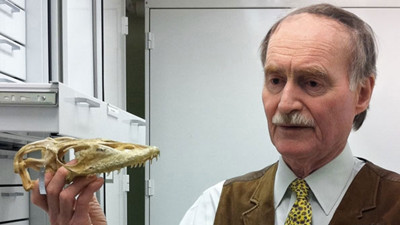(单词翻译:单击)
中英文本
Farish Jenkins
法里什·詹金斯
Farish Jenkins, paleontologist and polymath, died on November 11th aged 72
法里什·詹金斯,古生物学家、博学者,卒于11月11日,享年72岁
INDIANA JONES is the ultimate action -hero academic: played by Harrison Ford, the indomitable professor outwits Nazis and other villains in search of religious relics, lost temples and alien artefacts. Farish Jenkins preferred a rifle to a bullwhip, and it was palaeontology, not archaeology, that he made glamorous. But he did have a stylish hat, a military background and adventures in wild places. His adoring students dubbed him the real life version of the cinematic creation.
由哈里森·福特出演的印第安纳·琼斯是动作片中最出色的学者主人公:这位不屈不挠的教授在寻找宗教遗物、失落的寺庙和天外文物的过程中以智慧战胜了纳粹和其他坏人。比起牛鞭,法里什·詹金斯更喜欢步枪,而且他是一位出色的古生物学家,而非考古学家。不过他的确拥有一顶时髦的帽子,也是军人背景出身,也有过在野外冒险的经历。崇拜他的学生称他为电影人物的真人版。

A Marine Corps captain, he trained as an artillery officer, “cascading expensive, high explosive ordnance onto stockpiles of junk cars”. Unlike most modern academics, he defied categorisation into narrow specialism. A “hybrid” as he put it, he was anatomist, zoologist and vertebrate palaeontologist in equal measure.
他是一名海军陆战队的队长,但却接受过和炮兵军官一样的训练,“将大量昂贵的高爆炸性军械放置到垃圾车的储备军火中”。和大多数现代的学术研究者不同,他反对那种把学科分为狭窄类别的做法。他在解剖学、动物学、脊椎动物古生物学上的造诣都同样高深。用詹金斯自己的话来说,他是一名“杂学家”。
Arriving at Yale to study geology in 1964, he was told that all major aspects of vertebrate evolution were already understood. He feared that he and his friends would be left “to build our careers with carefully stacked minutiae”. In fact, “titanic” discoveries awaited. But to crack the secrets of the fossil world, he had to master not only the rocks but the organisms they hid. He was the first Yale Graduate School student to cross over to the Medical School, to study anatomy and embryology.
1964年,詹金斯进入耶鲁大学学习地质学,有人告诉他,所有有关脊椎动物进化的主要方面都已被研究透了。他曾担心他和他的朋友只能“通过那些小心翼翼堆积起来的细枝末节来构筑他们的事业”。事实上,“重大的”发现还在前方等着他们。但想要挖出化石世界的秘密,他不仅要精通岩石方面的知识,还要了解藏在这些岩石中的生物的习性。他是耶鲁大学研究生院第一个跨学科去医学院学习解剖学和胚胎学的学生。
Later, he illustrated his lectures with fine anatomical drawings, painstakingly rendered with what he proudly called Harvard's best collection of sharpened chalks (he was not a PowerPoint person). When necessary, he would draw bones and muscles on his own suit. To illustrate the body's natural shock-absorbers, he would stomp round the room on a peg leg, reading the description of Captain Ahab's gait in “Moby Dick”. Students loved that, and how he timed his lectures to the second.
后来在讲课时,他会不辞辛苦地用粉笔画出精妙的解剖图,还骄傲地把用过的粉笔头称作是“哈佛大学最佳尖头粉笔收集品”。必要的时候,他会把骨骼和肌肉画在自己的西装上。为了展示人体自带的减震器,他会用木制假腿在教室里跺着脚走来走去,一边读着《白鲸记》中描述亚哈船长步态的语句。学生们喜欢他这样做,也佩服他能准确地掌控讲课时间,毫秒不差。
He had no time for academic squabbles and protocol, brushing off rebukes and bureaucratic constraints. Charm was his first weapon, obstinacy his second. It was not just his clothes and vocabulary that were old-fashioned. He prized thoroughness. Unusually for modern academia, he showered praise on colleagues and deprecated his own triumphs. But he was a mighty foe when roused. He could swear like a Marine, “without repeating myself” and helped oust the abrasive Larry Summers from the Harvard presidency.
他没有时间来应付学术争吵和学术礼节,对别人的指责和官僚政治的约束视而不见。魅力是他的第一大武器,固执次之,在他身上,过时的不仅仅只是衣服和词汇而已。他很珍视认真详细这一点。他时常赞扬自己的同事,却认为自己的成功不屑一提,这在当今学术界是很不寻常的。但他可不是好惹的。他会像海军一样破口大骂,“老子只说一遍”,他还帮忙将粗鲁的拉里·萨默斯④从哈佛大学校长的职位上赶了下去。
The first field trip was to Africa, where his “very close and extremely naive encounters” with the local fauna included a self-portrait with a black rhino (plentiful as “rats in a dump” in those days). The beast took offence and charged; Mr Jenkins made it back to his car minus a lens cap. Living vertebrates, he decided, were just as interesting as their extinct relatives.
他的第一次实地考察去的是非洲,虽然经验不足,但他还是近距离地接触到了当地的动物群,还在那里画了一张与黑犀牛的自画像。当时黑犀牛因恼怒猛冲了过来,詹金斯先生逃回了汽车中,却丢了一个镜头盖。他确信,活着的脊椎动物和它们已经灭绝的亲属一样有趣。
High speed cineradiography, plus treadmills and a wind tunnel gave him new insights into how animals move: walking, trotting, galloping, flying and brachiating (the way monkeys swing). His efforts reached, he said proudly, “circus-like” proportions. “Tree shrews ricocheted across my bookshelves and desk,” he recalled. University bosses were appalled. His students and colleagues were captivated.
高速的放射性电影照相术加上踏车和风洞使他找到了研究动物运动方式的新角度:散步、慢跑、疾驰、飞翔以及用臂膀吊荡树枝前进。他骄傲地说,他通过努力达到了“马戏团一般的”规模。“树鼩在我的书架和书桌上跳来跳去”,他回忆道。学校里的领导为此而震惊,他的学生和同事却因此而着迷。
But fieldwork was even more fun. The most arduous expeditions were to east Greenland and arctic Canada, armed with lavatory paper to wrap the fossils, and chocolate bars for the diggers. Mr Jenkins was a distinctive addition to the landscape: invariably well-dressed, and sporting a beloved Czechoslovak rabbit-fur hat, a pocket-watch, a flask of vodka and a gun. He rigged trip wires and automatic rifle fire to deter polar bears from the camp at night. A cast of a huge paw print in his office was a souvenir of a particularly narrow escape.
但更有趣的要数野外工作。对詹金斯来说,最艰难的探险莫过于去东格陵兰岛和加拿大北极地区的那次。当时他身上带着用来包裹化石的卫生纸和为挖掘工作者准备的巧克力棒。他为那儿的景色添加了独特的一笔:他总是穿得十分得体,神气活现地戴着他钟爱的捷克斯洛伐克兔皮帽,还有一只怀表、一瓶伏特加和一把枪。他用绊网和自动步枪的扫射来阻止北极熊在夜间闯入营地。在他的办公室里,放着一个巨大爪印的金属铸模,用来纪念他曾艰难地从“熊”口脱险。
The trophies of those trips were carefully chipped open at Harvard. One proved to be the great find of his life: Tiktaalik roseae. “Rose” was the Christian name of an anonymous benefactor who subsidised the expeditions. Tiktaalik was a homage to his Inuit hosts: their word for a large freshwater fish. In fossil-speak the discovery was “the elpistostegalian central to understanding the emergence of tetrapods”. In layman's language, it was a 375m-year-old fish with legs, a rudimentary ear and a snout for catching prey—a vital clue to how living beings first moved from sea to land.
这些旅途的战利品都被小心翼翼地展出在哈佛大学。其中一个是他一生中的重大发现:提塔利克鱼。其中的“rose”是捐助此次探险的一位匿名人士的教名,Tiktaalik则是为了向探险时招待过他们的主人因纽特人致敬:在因纽特人的语言中,该词的意思是“一种很大的淡水鱼”。用化石学中的话来说,此次发现的是“对理解四足动物的出现十分重要的希望螈类生物”。用外行人的话来解释,提塔利克鱼距今已有3.75亿年历史,身上长着脚和未进化完全的耳朵以及用来捕食猎物的鼻口部—它为人们研究生物最初如何从海洋进化到陆地上来提供了重要的线索。
Smart man
智慧之人
Another big find was what he called the “ugliest animal in the world”. It was a 210m-year-old armoured marine creature. Mr Jenkins spotted its distinguishing feature: that it opened its mouth by lifting its upper jaw. He was crucial in discovering the world's earliest known frog, which unlike its salamander-like ancestors had hind legs for jumping. He found that in 1981 in the Arizona desert. It initially looked like “road kill”, his colleague Neil Shubin said: a 190m-year-old mash of four different frog skeletons. The two men spent the next 14 years picking them apart and putting them back together. They named their find Prosalirus bitis, combining a Latin word meaning “leap forward” with a Navajo word for “high above it”.
詹金斯称他的另一个重大发现为“世界上最丑的动物”。这种有着坚硬外壳的海洋生物距今已有2.1亿年。詹金斯先生发现了这种生物所独有的特征:通过抬起上颌来张嘴。在发现人类已知的最早的蛙类上詹金斯也扮演了十分关键的角色,这种蛙类和它的祖先蝾螈不同,它没有用来弹跳的后肢。1989年,詹金斯在亚利桑那沙漠发现了这种生物。他的同事尼尔·舒宾说,最初他们发现这种生物时,它们看起来像是“被车压死的”:四只距今已有1.9亿年的蛙类的骨骼被压碎了搅在一起。詹金斯和舒宾两个人花了14年的时间把这些骨骼分开,又重新组合在一起。他们将这种蛙类命名为Prosalirus bitis,这一名字由拉丁文中的“向前跳”和纳瓦霍语中的“高于某物”组合而成。
After a bout of cancer he dismissed a visitor's worries, saying: “as a palaeontologist, I'm familiar with extinction.” In his spare time he trapped the chipmunks that infested his barn and made prodigious quantities of cider from his own apples.
在詹金斯癌症病发之后,有人忧心忡忡地来探望他。他宽慰对方说:“作为一位古生物学家,我对‘灭绝'可是熟悉得很”。他曾在空闲的时候诱捕侵入谷仓的花栗鼠,也曾用自己种的苹果酿造了数量可谓多得惊人的苹果酒。
词语解释
1.in search of 寻找
Lawyers in search of new markets.
律师们寻找新市场。
At the time, jazz was really just a well-capitalized platform in search of product.
那时,Jazz事实上只是一个资本金充足的寻找产品平台。
2.cross over 穿过
He's developed a cross over dribble.
他开发了一种跨越运球。
Airborne and soon approaching the timika airport we cross over a river.
我乘坐的飞机在快要到达蒂米卡机场的时候越过一条河流。
3.render with 渲染
I do my render with the textures activated and the red light off.
我使我与激活纹理和红灯亮。
The facades have a backdrop of white render with individual elements highlighted with cladding of varying colors.
建筑的正立面有一个白色为底的背景和个性化元素的各种彩色高饱和度涂层。
4.brush off 刷掉;掸掉
Still, many true believers will brush off the rattle and keep on believing.
不过,许多真正信念坚定的投资者不会理睬这样的波折,依然会继续坚持己见。
Increased public scrutiny will also make it harder for executives to brush off criticism.
加大公众监督力度将会使经理人很难对批评置之不理。


